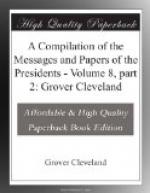My desire was carried to the utmost on seeing in your message at the opening of the Twenty-ninth Congress of your Republic a sincere profession of political faith in all respects conformable with the principles professed by these States, determined, as they are, to sustain with firmness the continental cause, the rights of Americans in general, and the noninterference of European powers in their concerns.
This letter announces the critical situation in which Nicaragua was placed and charges upon the Court of St. James a “well-known design to establish colonies on the coast of Nicaragua and to render itself master of the interoceanic canal, for which so many facilities are presented by the isthmus in that State.” No reply was made to this letter.
The British ships of war Alarm and Vixen arrived at San Juan de Nicaragua on the 8th day of February, 1848, and on the 12th of that month the British forces, consisting of 260 officers and men, attacked and captured the post of Serapaqui, garrisoned, according to the British statements, by about 200 soldiers, after a sharp action of one hour and forty minutes.
On the 7th day of March, 1848, articles of agreement were concluded by Captain Locke, on the part of Great Britain, with the commissioners of the State of Nicaragua in the island of Cuba, in the Lake of Nicaragua, a copy of which will be found in the correspondence relating to the Mosquito Territory presented to and published by the House of Commons of Great Britain on the 3d day of July, 1848, herewith submitted. A copy of the same document will also be found accompanying the note of the minister for foreign affairs of Nicaragua to the Secretary of State of the United States under date the 17th March, 1848.
By the third article of the agreement it is provided that Nicaragua “shall not disturb the inhabitants of San Juan, understanding that any such act will be considered by Great Britain as a declaration of open hostilities.” By the sixth article it is provided that these articles of agreement will not “hinder Nicaragua from soliciting by means of a commissioner to Her Britannic Majesty a final arrangement of these affairs.”
The communication from Senor Sebastian Salinas, the secretary of foreign affairs of the State of Nicaragua, to Mr. Buchanan, the Secretary of State of the United States, dated 17th March, 1848, a translation of which is herewith submitted, recites the aggressions of Great Britain and the seizure of a part of the Nicaraguan territory in the name of the Mosquito King. No answer appears to have been given to this letter.
On the 28th day of October, 1847, Joseph W. Livingston was appointed by this Government consul of the United States for the port of San Juan de Nicaragua. On the 16th day of December, 1847, after having received his exequatur from the Nicaraguan Government, he addressed a letter to Mr. Buchanan, Secretary of State, a copy of which is herewith submitted, representing that he had been informed that the English Government would take possession of San Juan de Nicaragua in January, 1848.




